When you’re starting out with your business, you’re doing it all: fulfilling orders, responding to customers, managing your social media, and so much more.
But while we pursue entrepreneurship for many reasons, having less time in our lives isn’t one of them.
That’s why the first “employee” many ecommerce entrepreneurs hire is a virtual assistant: someone who can take on the daily tasks and processes that are important for running your business, but not necessarily focused on growing it.
A virtual assistant is like having an extra pair of hands without hiring an actual employee. If you’re experiencing stress and the other “good problems” that come with success, it might be time for you to consider hiring your own virtual assistant and get back some of those hours in your day.
What is a virtual assistant (VA)?
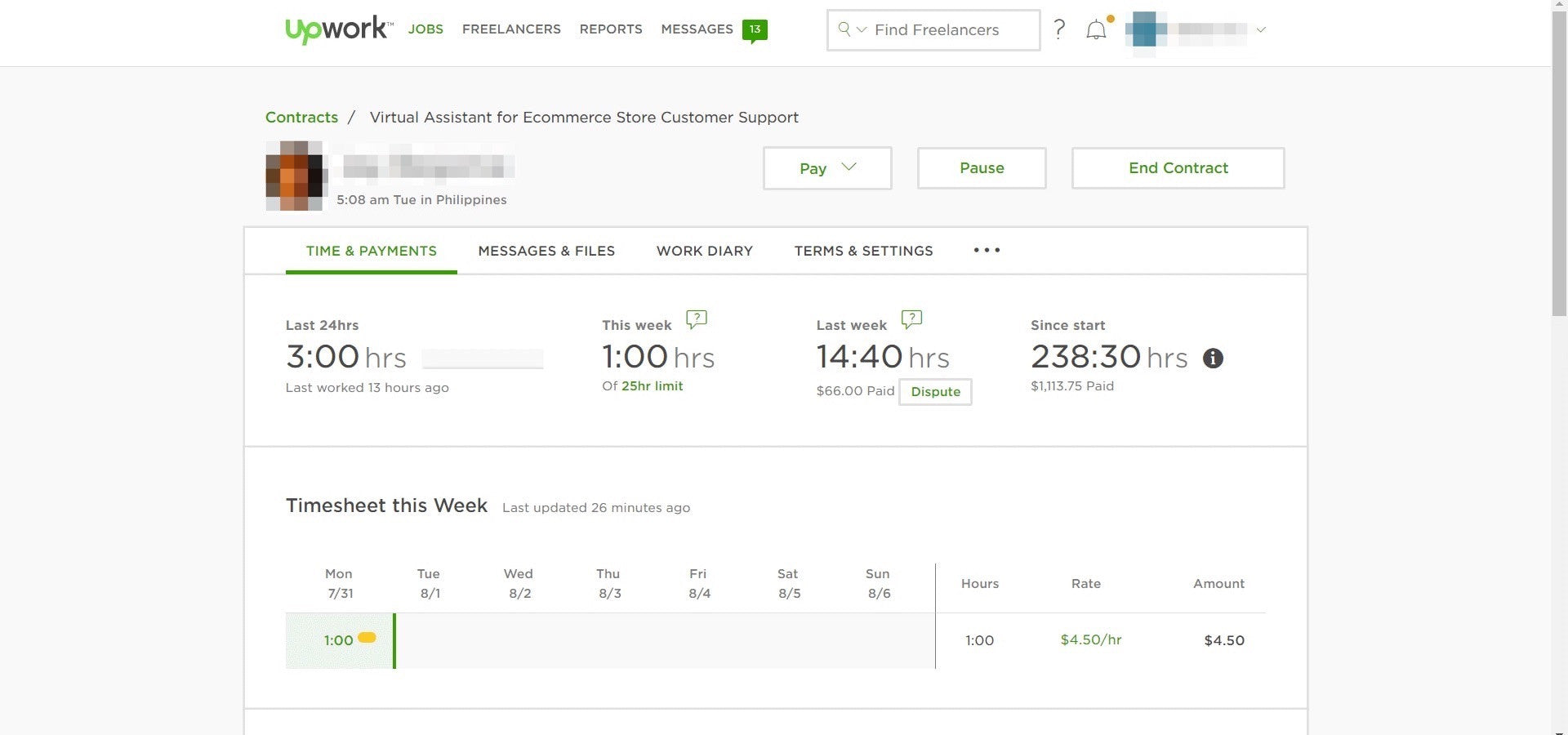
A virtual assistant (VA) is any form of remote help that you contract to hand off your workload. They can operate anywhere in the world, have multiple clients, and can be hired to take on a variety of your day-to-day tasks.
A virtual assistant is a common "first hire" for many entrepreneurs, especially amongst online businesses, who don't have the budget for a full-time employee or the time to continue doing everything themselves.
The difference between a VA and a freelancer or a traditional employee is that VAs are resourceful generalists (sometimes competent in areas like marketing communications or design) who perform tasks or routines rather than owning an entire function of your business.
And while they aren't permanent employees, they offer an affordable way to get ongoing help running your business without any of the additional expenses of hiring a full-time person (plus their services as a contractor are often tax deductible).
A virtual assistant won’t build your entire website, but they might help you manage parts of your store. They probably won’t write and manage all your content, but they might help you with research. They shouldn't take on an entire function of your business, but rather own a specific process or part of the whole machine.
Giving up control can be hard for entrepreneurs, and so taking on a VA is the perfect way to practice the soft skills of managing, delegating, and hiring on a smaller scale—all of which are essential to being a good leader.
What can you outsource to a virtual assistant?
While virtual assistants often do a lot of administrative tasks, you can also hire them to perform roles ranging from sales to social media management (if you give them clear guidelines and instructions).
If it’s a repetitive routine, you can probably hand it off to a VA. If you can write down a tedious process on paper, you can probably teach your VA how to do it for you.
As long as the tasks or processes are something a reasonably intelligent and resourceful person can accomplish when given clear instructions, you can probably get a virtual assistant to take them on.
Here are just some of the things you can hire a virtual assistant to do for you:
- Customer Service: Answering emails and phone calls from customers.
- Social Media Management: Curating content, replying to comments, and other community management tasks.
- Research: Looking for a list of bloggers/influencers to reach out to or curating stats or examples you can use in a piece of content.
- Store Management: Order fulfillment, inventory management, running sales for you (you can find VAs that have experience with Shopify, specifically).
- Data-entry: Bookkeeping or inputting data from different sources into a spreadsheet.
- Cold Calling: Making cold calls (usually provided with a script and canned responses to common questions), and scheduling meetings between you and prospects.
- Personal Errands: Getting flowers bought and delivered to your mom for Mother’s Day.
From the uses cases above, you can already see how much time a VA can potentially save you if you were to incorporate one into your day.
When should you hire a virtual assistant?
Generally, you'll want to get your hands dirty first before you hand anything off to a virtual assistant. This way, you'll know how to teach them the process, what guidelines you need to set, and what good work looks like.
That said, here are some of the conditions where hiring a VA would be ideal, even for a relatively young business:
- You're highly familiar with a process within your business and feel you could easily teach it to someone else.
- You find yourself thinking, "I could do bigger, more important things if only I had the time".
- You have the revenue or disposable income to go towards buying back your time.
- There's a task that you find really draining, such as customer service, that doesn't come naturally to someone like you (e.g. you're an introvert and feel drained after answering a few emails).
- You may not require full-time help, but just a handful of hours every day.
- You've already explored IFTTT, Zapier, Kit (Shopify's free marketing chatbot), and the App Store for ways to streamline a process, and found it'd be easier if another person just owned it.
- You feel overwhelmed by the new success you're experiencing with your business, or you work a 9-to-5 and are building your business on the side.
As an ecommerce store owner, customer service is likely the first thing you’ll want to outsource when you start making sales at a steady pace. Dealing with customers is one of the most stressful, time-consuming challenges for many. And the more you sell, the more of time it will consume.
Think about the opportunity cost of continuing to perform a task on a regular basis. What is your time worth? If you spend an hour a day answering customer questions, what could you be doing instead with that time, energy, and attention?
You can let go of these tasks and use your newfound hours to chase greater profits and other pursuits—for an affordable price.
How much does a virtual assistant cost?
Prices for virtual assistants vary, and usually, American-based virtual assistants cost more than overseas ones. Many charge by the hour. Some charge per task or project. And some will accept a flat rate for a certain amount of time.
Hourly is usually the best route in most cases, especially for daily tasks, and you can monitor your invoices to ensure there's a consistent output per hour.
If you’re diligent and willing to look internationally, it is possible to get a great virtual assistant for as low as $3 to $10 per hour for a role like customer service. It also depends on the work you want to outsource to them. Keep in mind that you generally get what you pay for and should always properly vet any potential hires.
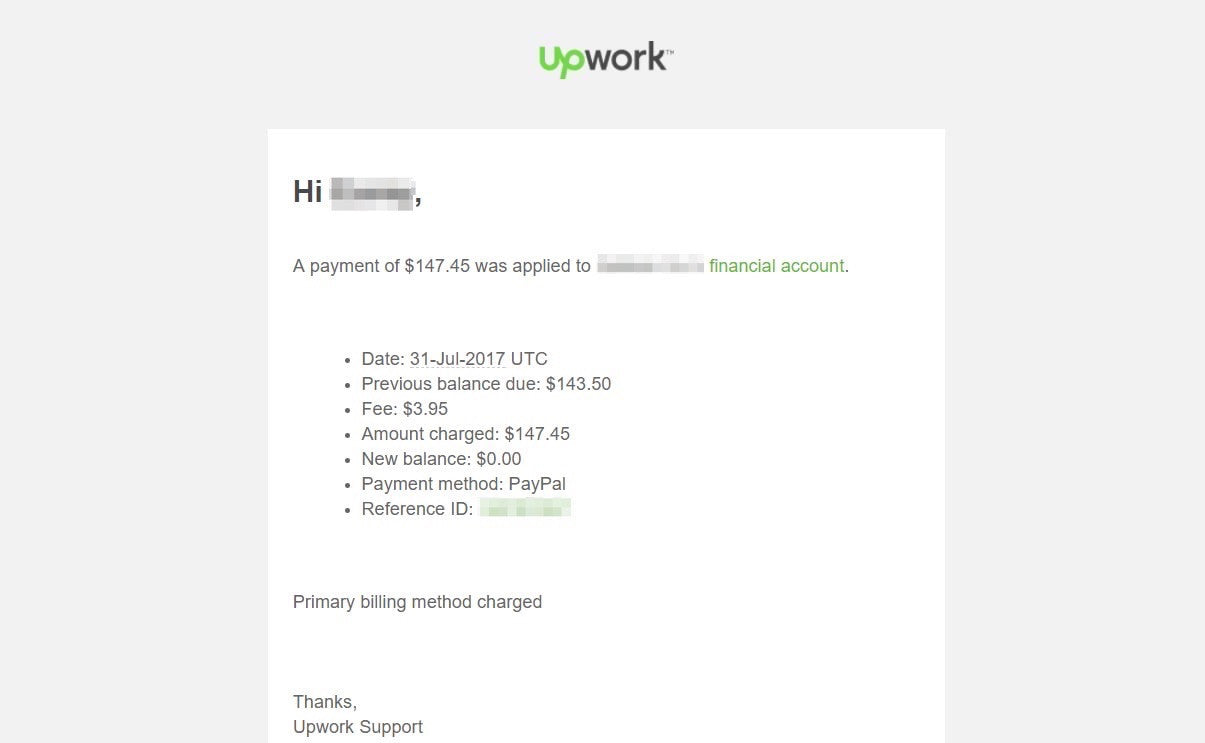
If you're a busy entrepreneur who's willing to pay a higher rate, you can also hire a remote "executive assistant", who can act as your right-hand person and do a wide range of business and personal tasks on your behalf.
The platform you use to hire your virtual assistant will also affect the amount of time you spend managing that relationship, which should also be considered alongside the price.
How to hire your first virtual assistant
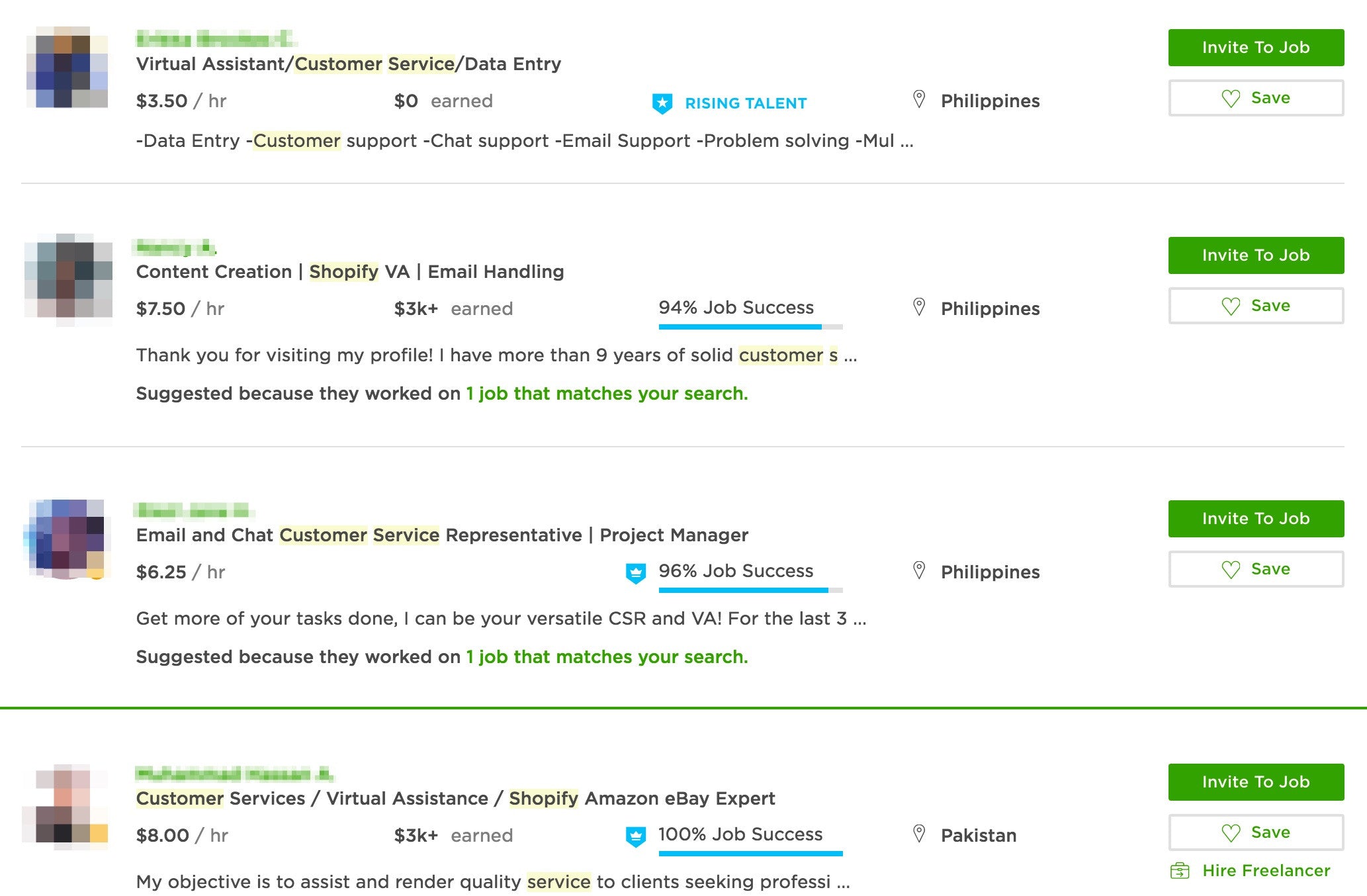
Not all VAs are the same. Like any other employee, you’ll need to vet them carefully and that starts with laying out your needs and conditions in a job description.
But before you write that, make sure you record the process you want to hand off.
1. Document your process before you outsource It
Working with a VA isn't as simple as explaining what you want over the phone and hoping they do it right. You can ensure fewer errors, and that the job gets done the way you want, if you document the entire process first and create guidelines for them to follow.
If it involves a basic routine, like managing aspects of your store, you can record your screen and every click you make while you're doing it yourself using Quick Time or any screen recording app.
Not only does this recording make it easier to onboard someone else to this process, it also gets you to consciously go through every little step you'll have to eventually communicate to your virtual assistant.
For customer service, social media management, and other tasks where your VA will be dealing directly with customers, partners, or vendors, go through your past responses and create scripts or "canned replies" for every common scenario, like when a customer asks about the status of their order or wants a refund.
One of the keys to effective delegation is anticipating common obstacles and offering advice on the best course of action to take. Write these out as conditional rules: "IF X happens, THEN do Y".
Also consider the tools and platforms you use throughout the process, as it's far easier to find a VA with experience using certain apps (e.g. Zendesk, Hootsuite, Facebook) than it is to teach someone from scratch.
Remember: Your goal with outsourcing of any kind is to create less work for yourself, not more.
2. Write a job description to attract the right virtual assistant
In order to find the right VA, you'll need to write a job description that can attract someone with the skills and qualities you need. This will be your first filter for finding the right person.
Be sure to include:
- The scale of your business (e.g. how many sales/support tickets you typically get a day).
- The apps/tools they'll be using.
- Past experiences that will make them successful.
- Language requirements (e.g. "Excellent spoken/written English" if they'll be communicating with customers in the U.S).
- A specific list of the tasks they'll be performing for you.
- The keywords that prospective hires might be searching for, such as "social media management".
Feel free to adapt the sample job description below for a customer service VA to suit your purposes.
Sample VA job description
We run a 6-figure dropshipping business and receive dozens of support requests through Zendesk and Facebook every week.
We require someone with great customer service experience to help respond to tickets on Zendesk and messages on Facebook. We will provide answers to the most common questions we receive. From time to time, the candidate may be required to log into our Shopify store and look up orders, make changes to orders, or provide refunds.
Ideally, this candidate has experience with ecommerce, a dropshipping business, and Shopify. Experience with Oberlo is an asset.
Duties include:
- Checking messages on Facebook, answering questions
- Responding to and solving support tickets in ZenDesk
- Solving customer problems such as a change in their order
- Solving customer inquiries such as the status of their order, how long before their shipment arrives, etc
- Looking up orders in Shopify / Oberlo when required
- Moderating comments on Facebook posts, hiding complaints, deleting slander
Qualities needed to be successful:
- Excellent English comprehension and writing ability
- Courteous and compassionate customer service
- Problem-solving ability
- Zendesk experience
- Facebook experience
- Shopify experience
- Oberlo experience is a plus
- Experience with a dropshipping business is a plus
- Interest in yoga is an asset (our industry that we serve)
Other Skills: Customer Service, Customer Support, Shopify, Social Media Management, Zendesk
3. Hire your virtual assistant
While you can post your virtual assistant role on a traditional job board, forum, or social network, it's usually not worth it when you consider the lack of quality control or the advantages you get from using a platform that's built specifically for this purpose.
If it's your first time hiring a virtual assistant, especially for your Shopify store, we recommend you use Upwork to find affordable, experienced help.
Upwork also gives you the tools you need to make managing your virtual assistant(s) easier, including:
- A review system that ensures quality across the marketplace.
- A time-tracking feature that takes regular screenshots of your VA’s screen to keep them accountable.
- A chat feature for sharing files and feedback.
- Easy invoicing and global payments.
- A Non-Disclosure Agreement built into their Terms of Service
- Payments via an escrow service, so you only pay for the work that gets done.
Once you've posted your job description, you can reach out to prospects or invite virtual assistants to apply to your job posting, and wait until you start to get some replies. Make sure you interview any potential hires over Skype or Google Hangouts to ensure they're a good fit before you hire them, looking for references from past clients and other signs that attest to their past performance as a virtual assistant.
Managing your virtual assistant
Once you've hired your virtual assistant and brought them up to speed using the documentation you created, and have established a preferred communications channel (Skype, Hangouts, Slack, or email), you'll need to ensure you only give limited access to your store, social accounts, or whatever else they'll be using to perform their job.
Trust is a big part of the relationship between you and your virtual assistant, and you should let them earn it through their performance. So avoid giving them your login credentials for your accounts, and opt for restricted user permissions wherever possible.
4. Protect your information and accounts
In your Shopify store, you can add your virtual assistant as a Staff Account with specific permissions based on the tasks they'll need to execute.

Most of the tools you probably use offer some form of limited access for other users.
In Facebook's Page Manager, you can assign them a specific role so they can curate and post content. In Zendesk or whatever customer service software you use, you can add them as a new user with the ability to respond to support tickets. With a Paypal business account, you can give them specific user permissions so they can make payments without giving them your credit card info. And in Gmail, you can set up email delegation so they can see and respond to emails on your behalf.
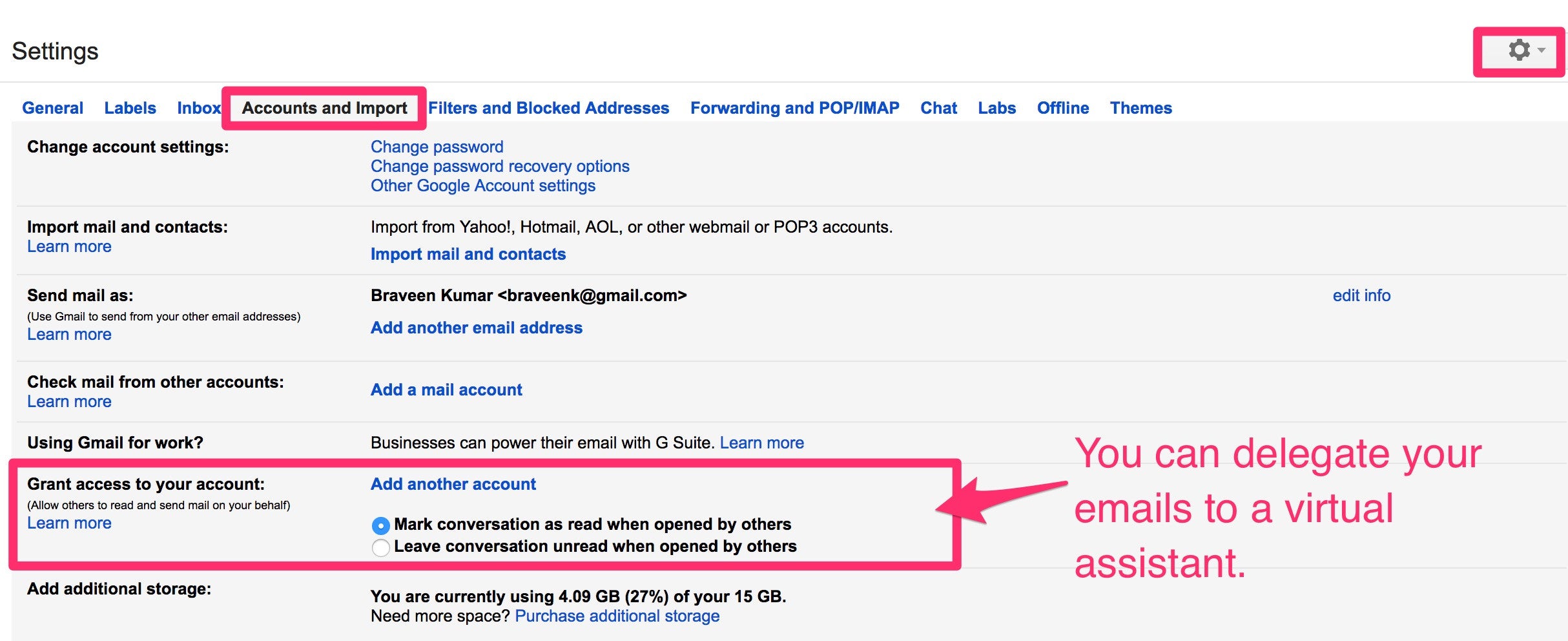
If you're dropshipping through Oberlo and AliExpress, you can give them access to your AliExpress account with the payment options saved and ready to go, monitoring your transaction history for any behavior you need to address.
Since virtual assistants work with multiple clients, sometimes with competitors in the same niche, it's wise to get them to sign a Non-Disclosure Agreement. You don't want them to reveal your secrets, after all. Some platforms like Upwork have this covered in their Terms of Service, but be sure to double check before you hand your VA any information that could be used against you or by competitors.
5. Set up a system for keeping them accountable
It's hard to gauge the pace at which your VA should be working, or how much work they should be getting done per hour. That's why it's important to enforce time-tracking.
While there are free tools like Toggl, and some VAs have software that helps them track their own time, Upwork has a robust time-tracking feature that also takes screenshots of your VA's screen at regular intervals.
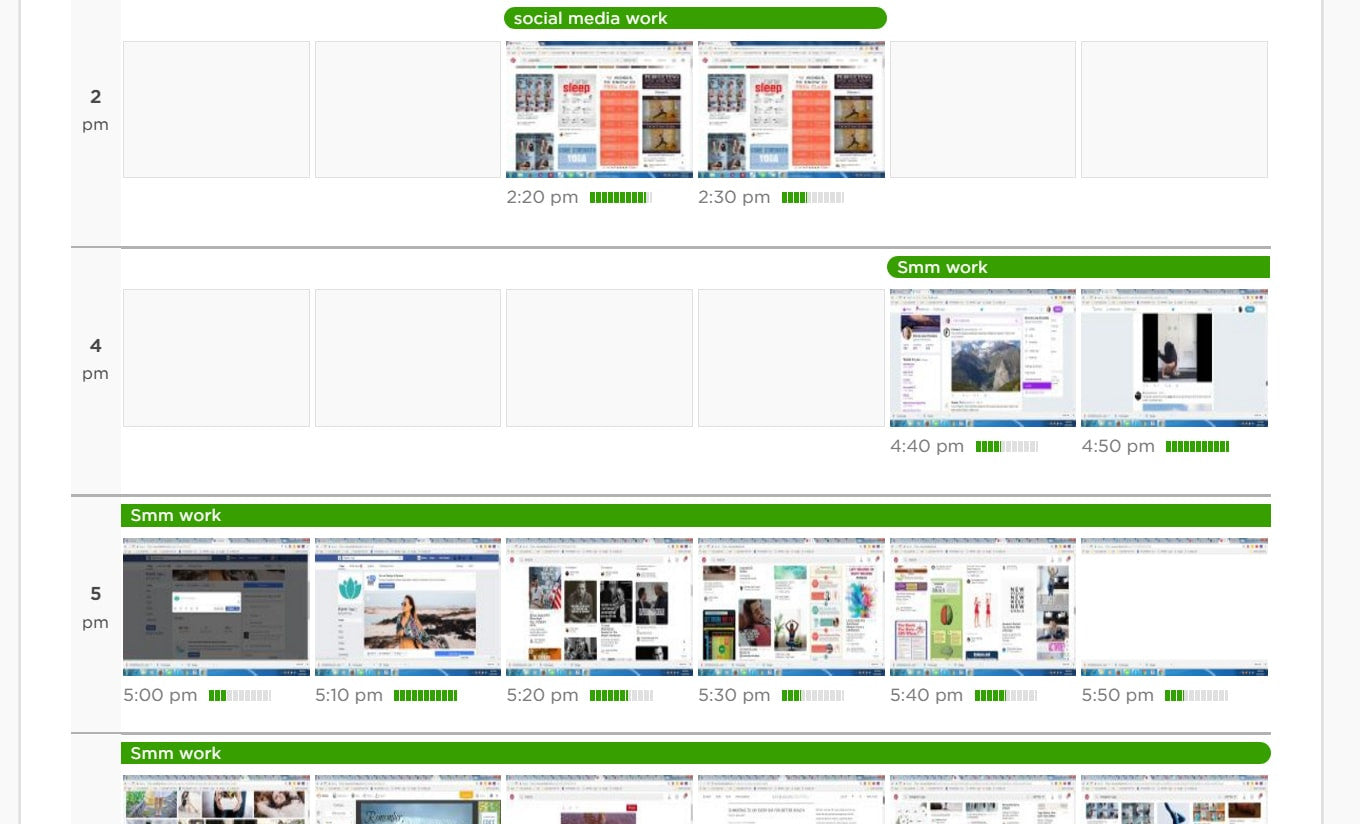
While you ideally want your VA to function independently without much oversight, check in with them every once in a while to see if there are ways you can streamline the process or improve their work.
You might even discover that your virtual assistant finds a better way to do the task than the way you prescribed, or that they've become so familiar with your business that they start to offer fresh suggestions like a full-time employee might.
Once your VA is comfortable with their tasks, you can even consider expanding their role and outsourcing more processes, or hiring an additional VA to manage another aspect of your business.
Other places to hire a virtual assistant
While Upwork is a great choice for hiring a VA that can take on aspects of your ecommerce business, there are plenty of other ways you can go about hiring a VA that come with their own pros and cons.
For an affordable on-demand virtual assistant that you only need occasionally, you can use Fancy Hands to access a pool of VAs who can complete one-time tasks. It's better for outsourcing personal errands (setting up meetings or negotiating your phone bill for you), or parts of a project, rather than an entire process as you won't get the same VA every time.
Zirtual is another popular option for a dedicated U.S-based virtual executive assistant that's experienced and skilled in one or many aspects of running a business. They'll cost more (starting at $398 a month), but can handle a mix of business and personal tasks for you throughout each month.
There are also agencies and independent VAs that you can hire outside of all of these platforms, but you'll likely have to handle a lot of the details like finding a good time-tracking tool and enforcing confidentiality yourself.
Learning to let go
In a funny way, the goal of entrepreneurship isn’t just to own a business, but to give up as much of it as you can, leaving parts in capable hands, so that your business can stay afloat without your full attention.
Outsourcing can be an unnatural practice for many entrepreneurs who relish control. But it's a key consideration for achieving the elusive work/life balance that's even harder when you're doing everything on your own.
Hiring a VA lets you focus on the things that matter most—growing your business, spending time with your family, or just giving yourself a few more moments to catch your breath.
Special thanks to Corey Ferreira for sharing his tips and process for hiring a virtual assistant to help run his 6-figure ecommerce store.
